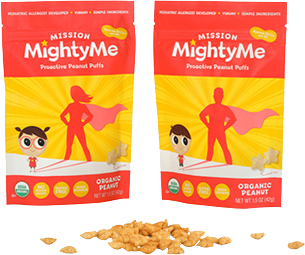Mission MightyMe : The Power of Peanut Puffs

Table of Contents
- Intro: Why Are Food Allergies on the Rise?
- The idea that transformed food allergy prevention
- Groundbreaking Research: Learning Early About Peanut Allergy (LEAP) Study
- LEAP Study Leads to New Feeding Guidelines Around the Globe
- Our Co-Founders: The Story of a Food Allergy Family
- Introducing Mission MightyMe
- The Launch of Proactive Peanut Puffs!
- Proactive Nut Butter Puffs
- Try Proactive Peanut Puffs and Proactive Nut Butter Puffs!

Intro: Why Are Food Allergies on the Rise?
Food allergy rates are on the rise - in fact, in the last couple of decades, food allergies among children in the U.S. have increased by 50% and nut allergies have tripled!
Today, 1 in 13 children have a food allergy, which is 8% of U.S. kids, or nearly 6 million children. In the UK, Canada, and Australia, the numbers are similar. Yet in places like Israel, Asia, and parts of Africa, that’s not the case.
So why are the numbers so high in the U.S.? There could be many factors at play, but one difference between the U.S. and those other countries is that for the past two decades, the standard medical advice in the U.S. was to avoid feeding babies potentially allergenic foods, whereas they have long been a common part of the diet in other parts of the world.
In 2000, The American Academy of Pediatrics (AAP) recommended that high-risk infants avoid peanuts and other common food allergens in infancy until age 3. Although the AAP rescinded these recommendations in 2008, avoidance of peanuts and other common food allergens in infancy remained the common practice.
Recent groundbreaking research led by our co-founder, has shown that withholding peanut foods from infant diets actually increases the risk of peanut allergy up to five-fold. This discovery reversed feeding guidelines around the globe to recommend regularly including peanut foods and other common food allergens in children's diets, starting in infancy.
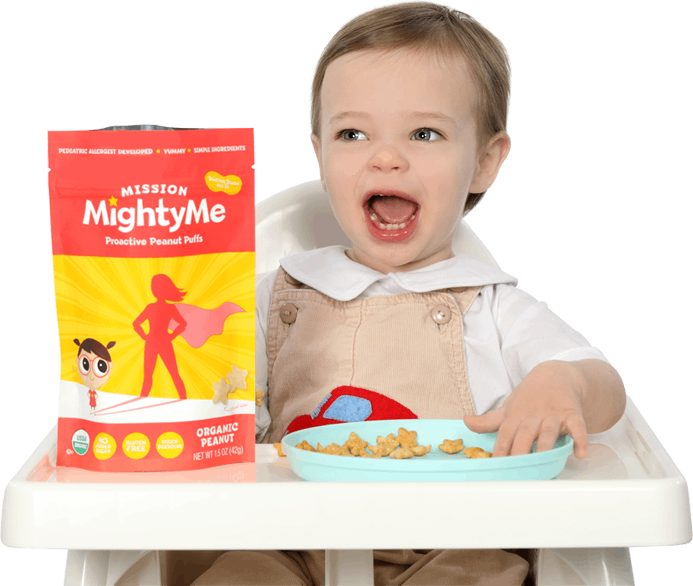
The idea that transformed food allergy prevention
About 20 years ago, Dr. Gideon Lack, Head of Pediatric Allergy at King’s College in London, was in Tel Aviv giving a lecture about peanut allergies to 200 pediatricians and allergists. His key takeaways included:
- Of the 200 physicians, only 2-3 acknowledged seeing a child with a peanut allergy within that year.
- Almost universally, babies in Israel were being fed peanut snacks early in the first year of their lives.
Dr. Lack connected these observations with a phenomenon called oral tolerance induction, where introducing early feeding of food such as egg, milk, and peanuts to young mice prevented the development of food allergies.
Dr. Lack and his colleagues went on to develop an observational study comparing the rates of peanut allergy among children in Israel to peanut allergy rates among Jewish children with similar genetic ancestry in the UK. The findings were stunning! Jewish children in the UK had a ten times higher rate of peanut allergies than their Israeli counterparts. The differences in the two countries came down to feeding practices:
- Israeli infants ate approximately 1.7 grams of peanut protein per week, starting early in the first year of life.
- Like the U.S. the vast majority of UK infants weren’t eating peanuts early on in life.
While guidelines in the U.S. and UK at the time recommended that babies avoid peanut foods in infancy, peanut puffs were a staple in Israeli infant diets.
Groundbreaking Research: Learning Early About Peanut Allergy (LEAP) Study
Revolutionary Research
Dr. Lack's observation in Israel led to the groundbreaking LEAP Study, designed to test his hypothesis that peanut allergy rates in Israel were lower because Israeli babies were regularly eating peanut foods, starting in infancy.
Key LEAP Study Components
- 5-year, NIH-funded, randomized controlled trial
- 640 babies between 4 and 11 months old.
- The babies had an existing egg allergy and/or severe eczema, and therefore were identified as high-risk for a peanut allergy.
- The babies were split into two groups: one group avoided peanut foods entirely and the other consumed age-appropriate peanut foods several times a week from the first year of life until age 5.
The Results
- By age 5, the rate of peanut allergies among children who avoided peanut foods, was 5 times higher than the children who had consumed peanuts regularly since infancy.
- Therefore, in high-risk infants, sustained peanut consumption beginning in the first 11 months of life was highly effective in preventing the development of peanut allergy.
The findings rocked the allergy world.
To learn more about the LEAP Study, visit our Learning Center .
LEAP Study Leads to New Feeding Guidelines Around the Globe
Based on the LEAP Study results, infant feeding guidelines have changed around the
globe.

United States Department of Agriculture (USDA) and Health and Human Services (HHS) Guidelines
The United States Department of Agriculture (USDA) and Health and Human Services (HHS) published the ninth edition of the Dietary Guidelines for Americans 2020-2025. The guidelines, which are published every five years, provide science-based advice on what to eat and drink to promote health, reduce risk of chronic disease, and meet nutrient needs.
For the first time in history, the guidelines address infant health and food allergy prevention.
From the USDA and HHS Guidelines for Infants:
“Introducing peanut-containing foods in the first year reduces the risk that an infant will develop a food allergy to peanuts.”
“Introduce infants to potentially allergenic foods along with other complementary foods.”
To learn more about the USDA Guidelines, read our blog.
National Institute of Allergy and Infectious Diseases (NIAID) Guidelines
Based on risk factors, the NIAID published the following guidelines for the Prevention of Peanut Allergy in January 2017. Here’s a summary:
Guideline #1
If your infant has severe eczema, eff allergy, or both (conditions that increase the risk of peanut allery), he or she should have peanut-containing foods introduced into the diet as early as 4-6 months of age, but only after evaluation by a physician and possible allergy testing.
Guideline #2
If your infant has mild to moderate eczema, he or she may have peanut-containing foods introduced into the diet around 6 months of age to reduce the risk of developing peanut allergy. You may choose to introduce peanut foods at home, or under the supervision of your doctor if your doctor if you prefer.
Guideline #3
If your infant has no eczema or any food allergy, you can freely introduce peanut-con-taining foods into his or her diet.
More information is available in the Addendum Guidelines for the Prevention of Peanut Allergy in the United States.
American Academy of Pediatrics (AAP)
The AAP endorsed the NIAID guidelines and published a report in 2019 on the effects of early nutritional interventions on infants and children with atopic disease. The recommendations are based on the LEAP study.
Learn more about the AAP Guidelines.
Countries Around the Globe Adopt New Guidelines
The Australasian Society of Immunology and Allergy, the Canadian Paediatric Society, and the Japanese Society of Allergology have also developed and implemented new food allergy prevention guidelines based on the LEAP Study. To learn more about these guidelines and others, check out our Clinical Guidelines page.
Our Co-Founders: The Story of a Food Allergy Family

Catherine and JJ Jaxon are proud parents of three children and the co-founders of Mission MightyMe. Their oldest daughter is allergic to most nuts after they followed the old guidelines to avoid them in infancy.
So when their youngest child started solids, they were determined to follow the new research and include peanuts and other common food allergens in his diet to avoid the same outcome. However, they quickly discovered that it was a huge challenge.
Introducing Mission MightyMe
Catherine and JJ began looking for products that would make early allergen introduction safe and easy but came up short. Nuts and nut butters are choking hazards for babies, and the entire baby food industry was allergen-free.
So the Jaxons joined forces with Dr. Lack to change that, and that’s when Mission MightyMe was born. The company was founded with the mission to end the food allergy epidemic, so all kids can reach their mighty potential! Together, the founders wanted to create a nutritious and delicious line of food for children that makes it simple to include nuts and other common food allergens in little ones’ diets, as pediatric feeding guidelines now recommend. They wanted to normalize - not medicalize - the process of feeding babies with a fun, all-family snack.
Dr. Lack joined the company as a co-founder. Todd Slotkin, one of the original creators and a former Chairman of the non-profit Food Allergy Research & Education (FARE) organization, also joined the company. Todd is a food allergy advocate and pioneer and has two sons with life-threatening nut allergies.

CATHERINE JAXON
Co-Founder + Co-CEO

J.J. JAXON
Co-Founder + Co-CEO

DR. GIDEON LACK
Co-Founder + Scientific Advisor

TODD SLOTKIN
Co-Founder + Advisor

Peanut Allergy Prevention Made Simple

Puffs with Purpose
Created by the global expert in food allergy prevention to make it deliciously simple to include peanuts in infant diets, as pediatric guidelines recommend.*
Research
The Learning Early About Peanut Allergy (LEAP) Study, led by our co-founder Dr. Gideon Lack, found that the majority of peanut allergies can be prevented by starting peanut foods in the first year of life, and consuming them regularly until age 5.
Head of Pediatric Allergy, King's College
Dr. Gideon Lack,
The Launch of Proactive Peanut Puffs!
The mission was to make it deliciously simple for parents to follow updated pediatric guidelines for including peanuts and other common food allergens in little diets, early and often. Proactive Peanut Puffs were the first product to launch in early 2020. They were developed in accordance with Dr. Lack’s research, use only simple, organic ingredients, and contain more than 50% peanut.
The LEAP Study showed the importance of keeping peanut in the diet regularly until age 5, so MightyMe Peanut Puffs dissolve quickly for babies and taste delicious for big kids too, making them a perfect all-family snack.
Proactive Peanut Puffs come in 1.5 oz pouches. One pouch per weeks meets the level of weekly peanut protein (6g) recommended by the American Academy of Pediatrics for high-risk infants.*
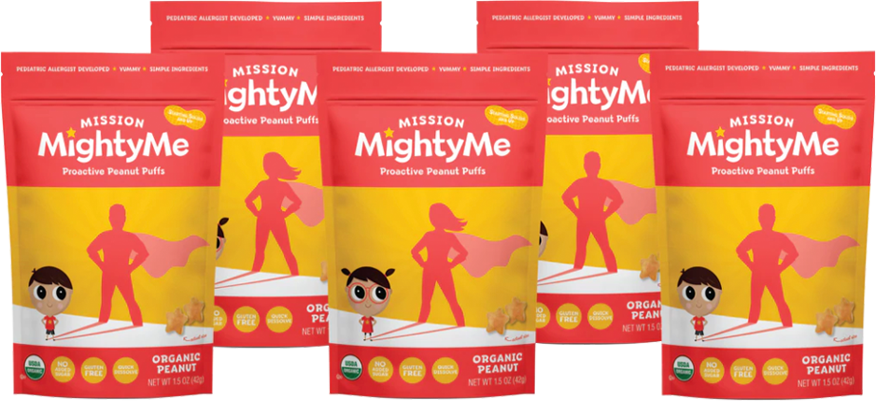
Organic &
Non-GMO
Simple
Ingredients
Zero Added
Sugar
Zero Palm
Oil
More than
50% Peanut
Pediatric
Allergist-Developed
Six Simple Organic and Non-GMO Ingredients
6 Simple Ingredients
- Organic rice flour
- Organic ground peanuts
- Organic peanut flour
- Organic peanut oil
- Sea salt (just a pinch)
- Calcium carbonate
(a natural source of calcium)
What You WON'T Find
No added sugar, palm oil, corn, preservatives, GMO ingredients or anything artificial.
Proactive Peanut Puffs are made of only natural, organic, and non-GMO ingredients - all sourced in the USA.
Proactive Peanut Puffs are made for babies starting solids and up and can be easily incorporated into the diet in different ways, depending on your baby's developmental stage.
Dissolves Quickly for Babies
Delicious for Big Kids
Ways to serve:

Crumble &
mix into any
puree

Great for that developing pincher grasp
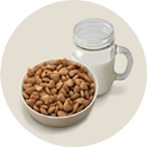
Soften puffs with water or breast milk and spoon feed
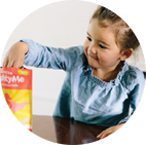
On-the-go snack
Proactive Nut Butter Puffs
Getting peanuts into a baby's diet safely can be difficult, but tree nuts are even more challenging due to the choking risk and the fact that there are so many tree nuts! So once again, the Mission MightyMe team created a solution for parents: Proactive Nut Butter Puffs pack 5 nuts in 1 delicious, quick-dissolve puff (peanuts, walnuts, cashews, almonds, and hazelnuts). The game-changing puff is the only baby-friendly puff on the market with peanuts and multiple tree nuts!
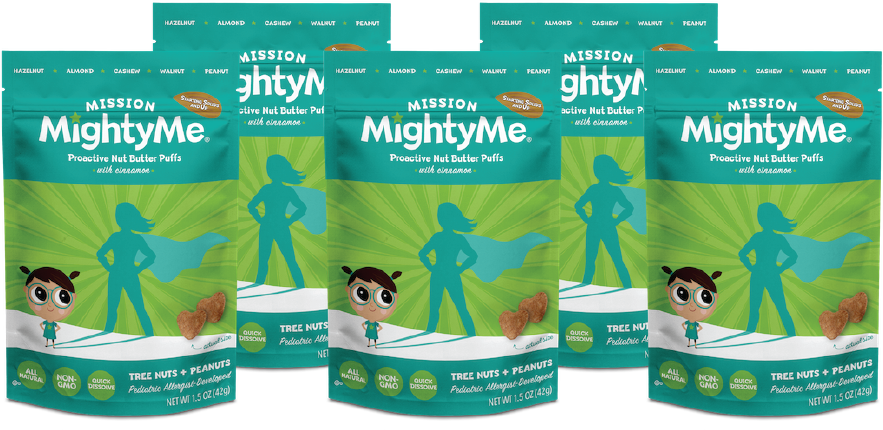

Organic &
Non-GMO
Simple
Ingredients

Zero Added
Sugar
Zero Palm
Oil

More than
50% Peanut
Pediatric
Allergist-Developed
5 Nuts, 1 Puff
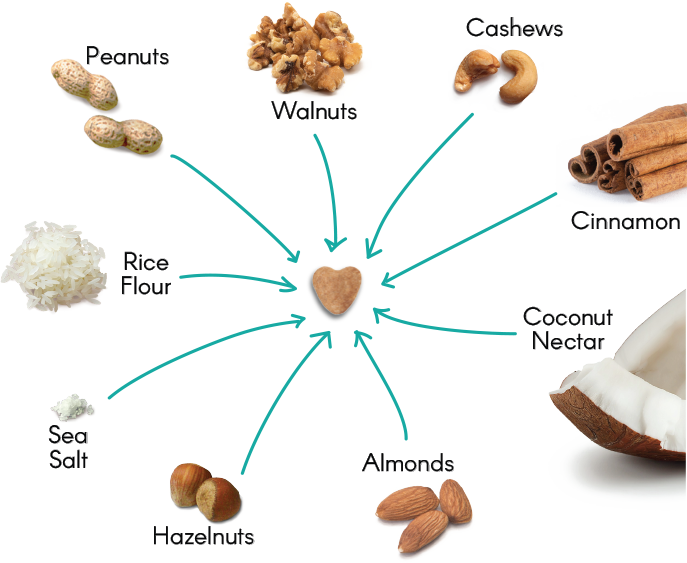
For more tips on how to introduce and regularly include common food allergens in your little one's diet, check out our Early Allergen Introduction Guide.
Try Proactive Peanut Puffs and Proactive Nut Butter Puffs!
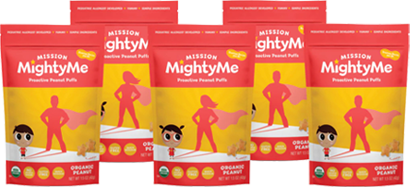
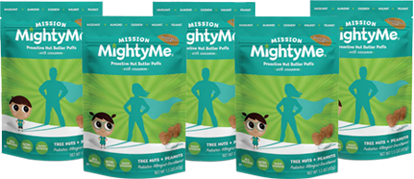
If your Pediatrician has said your little one is ready for peanuts or tree nuts, you can purchase MightyMe in two different ways:
- 1. The Shop page on Mission MightyMe’s website
- 2. Through Amazon (Prime eligible)
MightyMe Proactive Puffs are available in a 4-pack ($19.95) or 5-pack ($24.95), or as a monthly subscription at a 10% discount.
Remember to always talk with your pediatrician if you have any questions about whether your baby is ready for early allergen introduction.
Shop
Puffs with Purpose
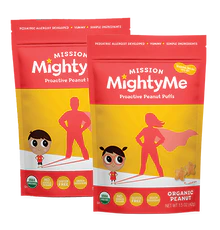
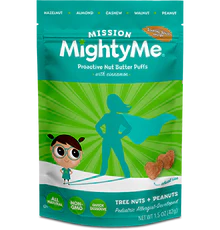
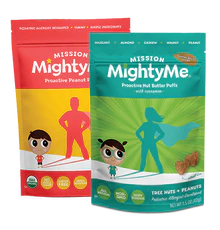
Here's what some of our customers have to say about Proactive Peanut Puffs
and Proactive Nut Butter Puffs.
DE 
“These puffs are IDEAL! Amazing taste, texture (no choking worries) and most of all – helping me to prevent what is a life-altering allergy to have to contend with. I’d highly highly recommend these, not only for parents of babies and any-age children but for you if you like peanuts! They are delish!”

Erin 
“Our whole family loves MightyMe peanut puffs! They are our 9-month-old’s favorite finger food... and I think my husband and I might keep buying them even after he’s grown up since we enjoy them so much too!”

Shana 
“My baby is loving these snacks. I felt it was a safe, easy way to introduce peanuts and provide consistent exposure to them.”
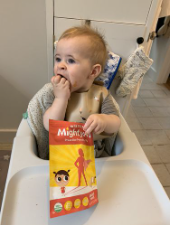
Katie 
“My 6 mo old has severe eczema so after a negative skin test our doctor encouraged us to introduce peanut ASAP. That was harder than we thought! She wouldn’t take thinned peanut butter on a spoon but LOVED these puffs! She’s now on her way to eating a full serving. They won’t last very long though because our toddler loves them too!”
If you have any questions, please see our FAQ page. or email us at info@missionmightyme.com
